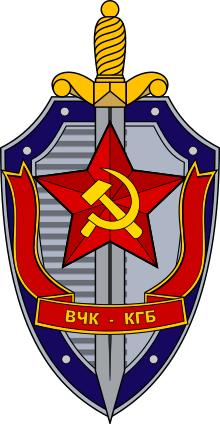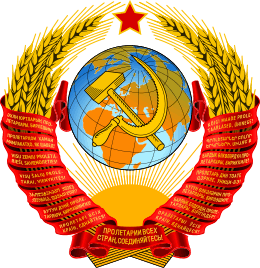State Political Directorate
The State Political Directorate (also translated as the State Political Administration) (GPU) was the intelligence service and secret police of the Russian Soviet Federative Socialist Republic (RSFSR) from February 6, 1922, to December 29, 1922, and the Soviet Union from December 29, 1922, until November 15, 1923.
| (GPU pri NKVD RSFSR) | |
 | |
| Agency overview | |
|---|---|
| Formed | February 6, 1922 |
| Preceding agency | |
| Dissolved | November 15, 1923 |
| Superseding agency | |
| Type | Secret police |
| Headquarters | Lubyanka Square, Moscow |
| Agency executive |
|
| Parent agency | Council of the People's Commissars |
Name
The official designation in line to the native reference is:
- Русский: = Государственное политическое управление (ГПУ) при Народном комиссариaте внутренних дел (НКВД) РСФСР
- tr =Gosudarstvennoe politicheskoe upravlenie (GPU) pri narodnom komissariate vnutrennikh del (NKVD) RSFSR – (GPU pri NKVD RSFSR)
- English: = State Political Directorate (also State Political Administration) under the People's Commissariat of interior affairs of the Russian Soviet Federative Socialist Republic (RFSR)
Establishment
| Chronology of Soviet secret police agencies | ||
| ||
| 1917–1922 | Cheka under SNK of the RSFSR (All-Russian Extraordinary Commission) | |
| 1922–1923 | GPU under NKVD of the RSFSR (State Political Directorate) | |
| 1923–1934 | OGPU under SNK of the USSR (Joint State Political Directorate) | |
| 1934–1941 | NKVD of the USSR (People's Commissariat for Internal Affairs) | |
| 1941 | MGB of the USSR (Ministry of State Security) | |
| 1941–1943 | GUGB of the NKVD of the USSR (Main Directorate of State Security of People's Commissariat for Internal Affairs) | |
| 1943–1946 | NKGB of the USSR (People's Commissariat for State Security) | |
| 1946–1953 | MGB of the USSR (Ministry of State Security) | |
| 1953–1954 | MVD of the USSR (Ministry of Internal Affairs) | |
| 1954–1978 | KGB under SM of the USSR (Committee for State Security) | |
| 1978–1991 | KGB of the USSR (Committee for State Security) | |
| 1991 | MSB of the USSR (Interrepublican Security Service) | |
| 1991 | TsSB of the USSR (Central Intelligence Service) | |
| 1991 | Committee of protection of the USSR state border | |
Formed from the Cheka, the original Russian state security organization, on February 6, 1922, it was initially known under the Russian abbreviation GPU—short for "State Political Directorate under the NKVD of the RSFSR" (Russian: Государственное политическое управление при НКВД РСФСР, Gosudarstvennoye politicheskoye upravlenie under the NKVD of the RSFSR"). Its first chief was the Cheka's former chairman, Felix Dzerzhinsky.
Mission
- Internal security
On paper, the new agency was supposed to act with more restraint than the Cheka. For example, unlike the Cheka, it did not have the right to shoot suspected "counter-revolutionaries" at will. All those suspected of political crimes had to be brought before a judge in normal circumstances.[1]
- Foreign intelligence
The 'Foreign Department' of the GPU was headed by a former Bolshevik and party member, Mikhail Trilisser.[2] The Foreign Department was placed in charge of intelligence activities overseas, including espionage and liquidation of 'enemies of the people'. Trilisser himself was later liquidated by Joseph Stalin during the Great Purge in 1940.
Disestablishment
With the creation of the USSR in December 1922, a unified organization was required to exercise control over state security throughout the new union. Thus, on November 15, 1923, the GPU left the Russian NKVD and was transferred into the all-union Joint State Political Directorate, also translated as "All-Union State Political Administration". Its official name was "Joint State Political Directorate under the Council of People's Commissars of the USSR" (Russian: Obyedinyonnoye gosudarstvennoye politicheskoye upravleniye under the SNK of the USSR, Объединённое государственное политическое управление при СНК СССР), or OGPU (ОГПУ).
Personnel
| Badge | Political | Military |
|---|---|---|
| none | Cотрудник Employee | Kрасноармеец Red Armyman |
| Агент 3-го разряда Agent third category | Командир отделения Squad commander | |
| Агент 2-го разряда Agent second category | Помощник командира взвода Assistant platoon commander | |
| Агент 1-го разряда Agent first category | Старшина роты, батареи, батальона, дивизиона First Sergeant of company, battery, battalion | |
| Сотрудник особых поручений Employee with special assignments | Командир взвода Platoon commander | |
| Нач. оперативного пункта Head of operative point | командир роты (полуэскадрона) Company commander (Commander of half-squadron) | |
| Нач. отдела инспекции; Пом. нач. адм.-следственной части Leader of inspection department; Assistant head of investigative unit | командир батальона (эскадрона) Battalion commander (Squadron commander) | |
| Пом. нач. отделения; Уполномоч. отдела предварительного дознания; Нач. адм.-следственной части Assistant departemental leader ; Plenipotentiary of preliminary investigation department; Head of investigative unit | командир полка Regimental commander | |
| Военрук инспекции Military director of inspection | Командир бригады Brigade commander | |
| Нач. отделения ГПУ Head of GPU branch | начальник и комиссар дивизии Chief and commissar of division | |
| Зам. нач. отдела ГПУ Assistant head of GPU department | Командир корпуса; Зам. нач. штаба войск ГПУ Corps commander; Assistant chief of staff for GPU troops | |
| Нач. отдела ГПУ Head of GPU department | Зам. Пред. ГПУ — Нач. штаба войск ГПУ Deputy chairman of GPU - Chief of staff of GPU troops |
See also
References
External links
- History of the MVD of Russia: 1917–1931 (in Russian)

